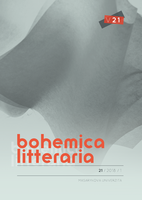Ke vzniku a recepci Bassova protektorátního románu
On the Genesis and Critical Reception of the Protectorate Novel by Eduard Bass
Author(s): Erik GilkSubject(s): Social history, Novel, Czech Literature, Fascism, Nazism and WW II, Philosophy of History
Published by: Masarykova univerzita nakladatelství
Keywords: Czech literature; World War II; social novel; Johann Gottfried Herder; philosophy of history; Eduard Bass; Cirkus Humberto;
Summary/Abstract: The present paper deals with the most extensive novel by Eduard Bass (1888–1946) Cirkus Humberto published in 1941. Although the novel was later produced as an operetta, a drama, a radio play and a TV series, literary historians have not inquired into this popular novel. On the other hand, there are many critical reviews of the period which document that the critical discussion was possible even in the third year of German occupation during the World War II. The study focuses on the genesis and critical reception of the novel and also attempts to interpret it as an update of the ideals of the Czech national revival. It is supposed that the conception of European history created by German philosopher Johann Gottfried Herder was encoded in the novel. His theory on a positive future of Slavonic nations had a significant impact on the beginnings of the Czech national revival. A thematic connection between Cirkus Humberto and the first fiction Klapzubova jedenáctka by Bass can be also found here (1922).
Journal: Bohemica litteraria
- Issue Year: 21/2018
- Issue No: 1
- Page Range: 87-100
- Page Count: 14
- Language: Czech

